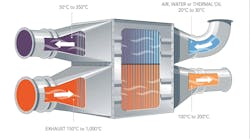Demand for motor control centers (MCCs) is rising around the world, driven by increasing levels of industrial automation, according to a new report from Frost & Sullivan.
A motor control center is an assembly of motor starters or overload protection devices such as contractors and/or overload relays that are connected by a common power bus bar in order to control several motors.
Market revenues are being boosted by the growth of intelligent MCCs (iMCCs), which offer remote diagnostic capabilities as well as features such as loss detection and predictive maintenance. These are gaining traction especially in the oil and gas, mining, water and wastewater and chemicals industries because they help to minimize maintenance costs, reduce equipment downtime and ensure operator safety.
Assessing the overall market for low- and medium-voltage MCCs, Frost & Sullivan says that revenues amounted to $4.06 billion in 2013 and will reach $5.12 billion in 2018.
Standardization of safety features and performance among regular MCCs has led to price-based competition and a decline in revenue share for these products. However, more and more customers are expected to opt for higher-priced iMCCs in the long term. As a result, the fall in MCC revenues will not be a concern for much longer, said Krishna Raman, senior research analyst for Frost & Sullivan Industrial Automation & Process Control.
"With iMCCs set to play an important role in the future of the market, manufacturers have to focus on rolling out these products. Manufacturers must develop iMCCs that can be easily integrated with other communication networks to allow customers to move to an integrated enterprise ecosystem," Raman added.
Something else to bear in mind is that, in order to succeed in markets around the world, MCC manufacturers should be able to meet multiple standards such as those of the International Electrotechnical Commission and National Electrical Manufacturers Association.
For those manufacturers that have already entered new markets, the maintenance of a robust product line and an extensive sales network will be key focus areas, Frost & Sullivan said.


